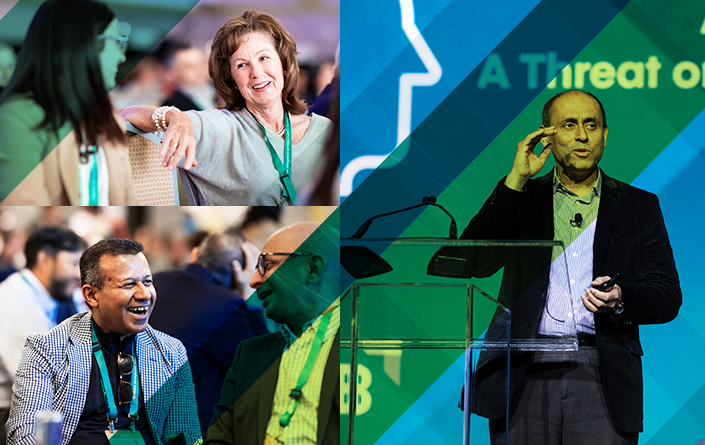How an Oil Executive Became an Environmentalist
- Future business leaders need to understand that they must weigh the costs and benefits of every decision they make.
- At Temple University’s Fox School of Business, students learn to ask tough questions because all their choices could have an environmental impact.
- Students develop greener ways of thinking when they act as consultants to organizations seeking innovative solutions to sustainability challenges.
As a child growing up in rural western Pennsylvania, I was surrounded by lush natural resources—green forests, clean rivers, and majestic mountains. I took for granted that they would always be there.
After I earned my bachelor’s degree in engineering at the University of Pittsburgh, I joined Schlumberger Limited, a leading oil and offshore drilling company. Working at this company allowed me to achieve my ambition of traveling the world. At various times, I lived in South Africa, Bolivia, and France, and I was exposed to cultures and customers from all over the globe.
But something else happened. I became more intimately aware of the world’s precious resources.
Producing oil is inherently not a clean business, but there are a lot of things that can be done to make it cleaner. For instance, I used to work in offshore oil rigs in the Gulf of Mexico, which features all sorts of fish and wildlife below the surface of its beautiful blue water. My colleagues and I were dedicated to keeping the ecosystem pristine. We made sure discharges were put into boats and ferried back to shore for proper disposal, instead of sending discharges right into the water, as had been common 70 years previously.
I was working on the oil rig during the 1980s, a time when the environmental movement had just begun to gather momentum. By the middle of the decade, the price of oil had dropped to under 15 USD per barrel, and consumption was high because prices were low. The average consumer had little concern about what oil was doing to the environment, and there was minimal interest in natural gas.
But at Schlumberger, we were very aware that oil and gas drilling could have detrimental effects on the planet, setting up a sharp conflict between business and the environment. We knew we had to be good stewards of the Earth—both from an environmental perspective and a business perspective. Even though I was an oil executive, I had become an environmentalist.
As I look back on my career, I reflect on how business has changed me—and how all of us have the potential to change business. When I worked at Schlumberger, I made careful and conscious decisions about how our work would impact the environment. Now that I’m the dean of Temple University’s Fox School of Business in Philadelphia, I want to ensure that business students understand that they also are making choices. I want them to know that they, too, can decide to be champions of the environment.
Making Decisions With Consequences
Making decisions is at the heart of what it means to be human. While people often act on instincts and gut feelings, they also can consult logic and data. Data-driven decision making is now at the core of business. Managers weigh the costs and benefits to decide what matters most.
Business schools are where future industry leaders learn the ins and out of making cost/benefit decisions. Students learn how to construct frameworks, collect data, identify value, and run analyses. They learn the power of data-driven decision making in any situation.
We need to help students realize that almost any decision they make can have an impact on the environment.
As educators, we need to help students realize that almost any decision they make can have an impact on the environment. Whether we’re teaching finance or supply chain management, we can pose simple questions about what is important to us as a society. Do we want cheaper electricity or cleaner energy sources? Do we want to rely on public transportation schedules or have the convenience of driving our own vehicles? Can we switch to driving more fuel-efficient cars?
What’s more, faculty have a duty to encourage students to ask tough questions about a business’s environmental impact. Is its energy usage efficient? What is the carbon footprint of its supply chain? How can it innovate packaging to reduce plastic waste? By teaching students to investigate these issues, professors can help students evaluate their own daily choices while they are applying business principles.
Gaining Practical Experience
There are many ways business schools can present alternative perspectives that encourage students to embrace greener ways of thinking. One of the most powerful approaches is to give students opportunities to serve on consulting projects with live clients. At Temple, MBA students in the Fox Management Consulting program have come up with innovative solutions to sustainability challenges while working with organizations such as these:
- A transit system designing a long-term operating plan that takes into account transportation's environmental impact.
- A global chemical supply company seeking better ways to create more sustainable packaging.
- An agricultural startup looking to partner with farmers to combat climate change.
- A sustainable agricultural association developing an operational plan to build a more environmentally regenerative and community-focused food system.
In these practical, real-world projects, our students have gotten their hands dirty, so to speak, to keep the Earth clean. Like me, they’ve grappled with the conflict between profits and people, business and environment, practicality and sustainability. They have come out more aware of the issues and more adept at finding solutions that benefit both sides.
There are many other ways business schools can teach students about sustainability. For instance, faculty can use case studies to show students the sustainability outcomes of key decisions and the real-life impact that individual choices can have.
Professors also can invite thought-provoking guests into the classroom. At the Fox School, we do that in part through our Innovation Leaders Speakers Series, hosted by our Innovation and Entrepreneurship Institute. Last fall, we brought in Matt Dwyer, vice president of product innovation and impact at Patagonia, an outerwear company committed to driving positive social and environmental change. Dwyer shared how the company values carbon emissions and water-efficient fabric production the same way it values its margins or net income.
In these practical, real-world projects, our students have gotten their hands dirty to keep the Earth clean.
Another approach is to open students’ eyes to what happens in different areas of the world. As part of the Fox School’s virtual immersion program, undergraduate students recently “traveled” to Argentina to learn about the country’s consumer goods economy. They also studied how organizations are using innovation and sustainability to create competitive advantages locally and internationally.
Finally, schools can create curricula specifically devoted to sustainability topics. More than a decade ago, the Fox School first began offering a minor in corporate social responsibility. In these courses, students focus on topics such as energy, ecology, and the economy; the triple bottom line of people, profits, and planet; and organizational leadership. They examine the industry’s old assumptions, challenge the traditional stockholder-primacy model, and offer ideas for new ways of doing business. In courses like these, students come to understand the environmental impact they can have in both professional and personal settings.
Considering Impact
It’s important that we address sustainability issues across business education—not just in specialized classes or concentrations. No matter what class we’re teaching, it’s our job as educators to show students that there’s more to decision making than a spreadsheet of data and a bottom line. We need to help them recognize the gravity of our situation and understand that change must happen immediately. We need to frequently return to the concept of costs and benefits as we urge students to consider the environmental impact of all their decisions.
Environmental impact was something we were constantly thinking about at Schlumberger, even though the oil and gas industry has a poor reputation on this front. As an individual, I always looked for the little, everyday things that we could do to make oil and gas extraction safe for both the workers and the planet. As a company, we constantly asked ourselves the big questions. Was the land of Alaska’s North Slope frozen solid enough to hold the weight of the equipment? Were we preventing water contamination? Was our environmental footprint as small as possible?
Every individual and every industry must ask similar questions. If business schools offer our students perspectives from a range of companies that value the environment, we increase the likelihood that our future industry leaders will weigh organizational benefits against hidden ecological costs.
If we teach students that helping humanity is an essential part of any decision, we can advance our ability to move forward as a collective society. We need a critical mass of people who care—not just those who say they care, but those who give more weight to the need to address climate change, protect wildlife, and conserve water when they make decisions. Only then will we stop doing more damage and give the Earth space to heal.
Humans are quickly running out of time to right the wrongs that have gone unchecked for too many years. When we focus on profit over people, we are losing the battle as a society. Let’s use the classroom to turn the tide of that battle.





